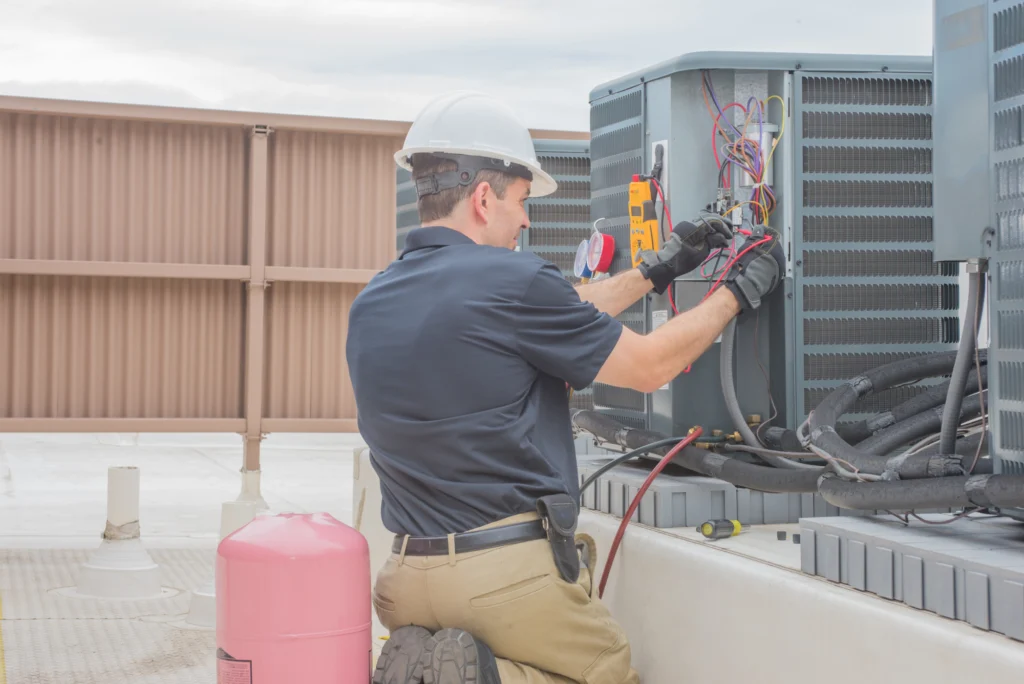How Often Does your Forney, TX Air Conditioner Need Service?
Today, US homeowners can expect to spend anywhere from $5,000 and $10,000 for a new and complete HVAC installation. Even for individual heating and cooling units, the average prices already range from $2,000 to $5,000.
That’s a lot of money, so it’s a good thing that boilers can last up to thirty good years, while furnaces can last up to 20. Central air conditioners, on the other hand, have a lifespan of up to two decades.
However, home heaters and coolers can only last this long with routine HVAC servicing. Even the most durable ACs, furnaces, or boilers will fail early without maintenance.
The question now is, how often do you need to get your heating and cooling equipment maintained? What are the best times of the year to get these tune-ups, and why do you even need them in the first place?
We’ll answer all these questions in this post, so be sure to read until the end!
HVAC Servicing: The Twice-A-Year Minimum
Servicing air conditioning units are best done prior to the actual cooling season. For furnaces or boilers, it’s best to get them serviced before the heating season. In short, HVAC maintenance is best scheduled once in the spring and another in the fall.
One reason is that winter and summer are the peak seasons for HVAC repairs and replacements. That’s why it’s common for HVAC contractors to be very busy during these times. Pre-seasonal service calls allow homeowners to beat the “queues” during the peak seasons.
At the same time, HVAC tune-ups done before the peak seasons usually cost less. In fact, reliable contractors offer HVAC maintenance subscriptions that come with discounts! These memberships not only save homeowners money — they also provide priority service.
What Happens to Ill Maintained HVAC Systems?
Servicing ac units helps ensure their efficient performance throughout the entire cooling season. After all, they’ve worked hard for six months during the previous winter. They then sat, unused, collecting dust and debris during the heating season.
The constant use of ACs reduces the amount of lubrication in gears and other movable parts. Without adequate lubrication, these components are at risk of more friction. This can then lead to overheating, which ultimately leads the parts to become damaged.
The same logic applies to furnaces and boilers. Some parts of the heating systems, however, are more prone to damages, such as the heat exchanger. The constant exposure to heat causes these parts to contract and expand continuously.
Throughout their use and their brief resting period, HVAC units also accumulate a lot of dirt. They do have filters to help reduce the number of contaminants that make it all the way into the system. However, many homeowners tend to forget to replace or wash these filters regularly.
As a result, dust and debris can impede the HVAC system’s air intake and outtake. Airflow restrictions can force the unit to eat up more energy as it tries to get in or blow out more air. This also places increased strain on the unit’s internal parts.
The longer these issues go on, the more energy the ill-maintained HVAC unit will consume. This then translates to increased energy bills. Moreover, the excessive strain and heat placed on the unit can lead to premature part failure.
Routine HVAC Maintenance Helps Maintain System Efficiency
One of the primary tasks involved in HVAC tune-ups is a thorough cleaning of both the heater and the cooler. This ensures that the system can properly draw in and circulate air within the building. Unobstructed airflow is key to the efficient performance of HVAC units.
In central AC maintenance, for instance, this includes cleaning the condenser and compressor. The HVAC technician will also remove dirt from the fins, coils, vents, and evaporator drain. If necessary, the tech will also replace the air conditioner filter.
In furnaces and boilers, the job involves cleaning the burners and gas or fuel lines. The technician will also remove and vacuum minor rust from the combustion chamber. Replacing the heating unit’s filter is often included in the service too.
By keeping HVAC systems free of clogs, homeowners can expect their units to perform at their peak. They can worry less about air conditioners not providing cool air during the hot days of summer. They can also avoid dealing with furnace problems that can leave them freezing in the cold.
Prevent Spikes in Heating and Cooling Bills
More than 40% of an average household’s utility bills go towards heating and cooling alone. Unfortunately, this can easily be greater in homes that have poor-performing HVAC units.
Clogged filters and vents, for starters, reduce the amount of air that gets to the condenser. As such, the condenser can circulate and pass less air to the evaporator coil. This reduction in the amount of transferred air means there’s less air to either cool or heat.
In this case, the HVAC unit will compensate by working harder to draw in more air. However, so long as there’s a clog in the filter or vent, this increased “workload” won’t make much difference. It’ll only make the heating or cooling equipment use more energy than normal.
More energy consumed means more money goes toward heating and cooling bills. There’s also the potential of dirty HVAC systems significantly affecting indoor air quality.
By simply getting an HVAC system serviced, homeowners can avoid such issues.
Beat the Heat and Stay Warm With the Help of Routine HVAC Tune-Ups
Pre-seasonal HVAC servicing no doubt extends the life of heating and cooling equipment. Tune-ups also help ensure that their heaters and ACs will last throughout the year. These should be good enough reasons for homeowners to invest in these services.
For homeowners in or near Forney, TX looking for quality HVAC service, Infinity Texas Air can help. Get in touch with us now to schedule your HVAC maintenance or repairs!




